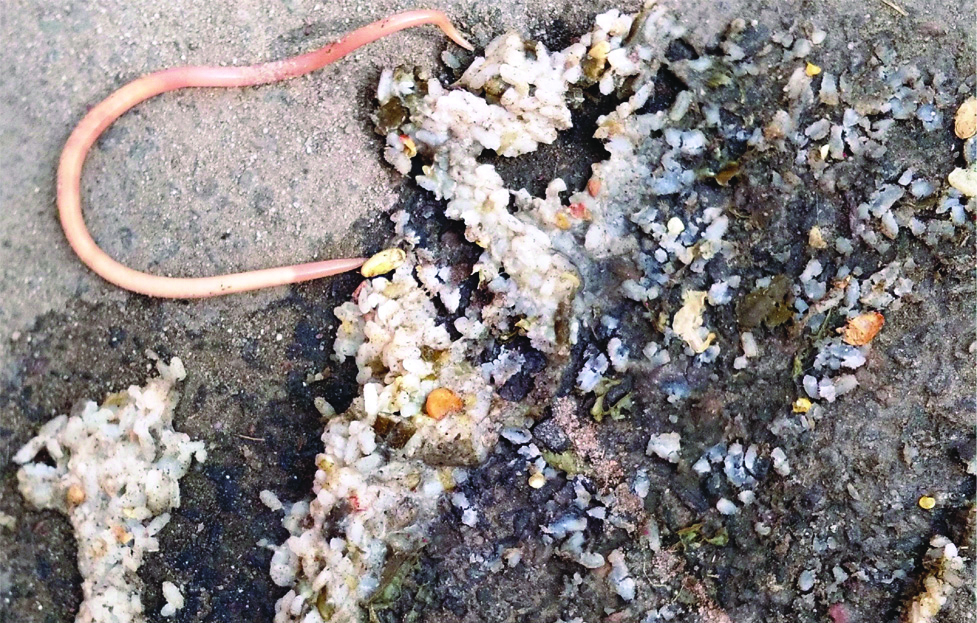Soil Transmitted Helminthiasis: An Interesting Scenario
Amrit Koirala1, Godfred Antony Menezes2
1 Medical Microbiologist, Department of Diagnostic Microbiology, Baptist Christian Hospital, Mission Chariali, Tezpur, Assam, India.
2 Associate Professor and Clinical Microbiologist, Department of Medical Microbiology and Immunology (MMI), RAK College of Medical Sciences (RAKCOMS), RAK Medical and Health Sciences University (RAKMHSU), UAE, Al Qusaidat, Ras Al Khaimah, United Arab Emirates.
NAME, ADDRESS, E-MAIL ID OF THE CORRESPONDING AUTHOR: Dr. Godfred Antony Menezes, Associate Professor and Clinical Microbiologist, Department of Medical Microbiology and Immunology (MMI), AAl Juwais, RAKCOMS, RAKMHSU, Al Qusaidat, Ras Al Khaimah, United Arab Emirates.
E-mail: godfred@rakmhsu.ac.ae
Ascaris, Live, Public health, Vomitus
Description
Ascaris infection caused by Ascaris lumbricoides (A. lumbricoides) is a neglected, soil-transmitted, common human nematodal disease. For centuries, it has been affecting the people worldwide. A. lumbricoides infects nearly one billion people worldwide with 60,000 deaths annually. The disease affects mainly tropical and sub-tropical regions of the world, mostly East Asia, China, Latin America and Sub-Saharan Africa [1]. Additionally, the parasite’s endurance and ubiquity poses a struggle in control measures. Hence, further research on measures of control of ascariasis infections is required [2]. There are data available on the prevalence of Ascaris infection from North-eastern region of India, like Assam [3]. The adult female grows up to 30 cm, whereas adult male grows up to 20 cm in length. The female adult worms, can produce environmentally resistant large numbers of eggs. The transmission of infection is due to ingestion of eggs contaminating food (fruits and salad) and water [1]. The migrating larvae in the lungs can cause cough, fever, skin rashes and haemorrhage. When a subject has a large burden of adult worms it leads to mechanical obstruction of the intestine, abdominal pain and vomiting. Large worm burden with their migration may also result in bowel perforation; peritonitis and passing from mouth and anus (diarrhea/bloody stools) [1]. A. lumbricoides, intestinal nematode outnumbers all other parasitic pathogens of infection some even presenting obstructive necrosis of the bowel from where large bunches of the adult worms were recovered. This picture taken at the bus stop of Tezpur town in Indian state of Assam raises several questions [Table/Fig-1]. At the time of taking of picture, the worm was still sluggishly motile while vomitus was just drying. Tezpur town is surrounded by rural population most of whom are tea tribes of Assam, also the nearest large town for the western Arunachal Pradesh, keeping this in mind it will be difficult to say where the infected person was exactly living. However, it makes it clear that the worm burden here is alarming and the infection rate is very high. This picture raises question on the several aspects of the infection such as burden, response to drug and the awareness [4]. Assam was one of the 12 states to be included to launch the National Deworming Programme in February 2015 [5]. Stool microscopy is still the best and easiest diagnostic test, screening for fertilised eggs which are rounded with a thick shell and an external mammillated layer that is brown (bile stained). The best diagnostic test is still the stool exam for ova and parasites, searching for large oval brown trilayered eggs with a mamillated coat. Eosinophilia can be demonstrated during the active larval migration phase to the lungs. Abdominal X-rays, ultrasound, Endoscopic Retrograde Cholangiopancreatography (ERCP) and CT scan can be used for diagnosis [1]. Dearth of continuous studies from many regions of India draws consistent attention for the surveillance and prevalence determination of soil-transmitted helminthiasis.

Learning Points
There is requirement for upgraded food, personal hygiene, accessibility to potable water and farming practices.
It is crucial to eliminate cultural sensitivities and advance compliance with medications.
The World Health Organisation (WHO) along with healthcare workers strives to lower the burden of Ascariasis.
Author Declaration:
Financial or Other Competing Interests: None
Was informed consent obtained from the subjects involved in the study? NA
For any images presented appropriate consent has been obtained from the subjects. NA
Plagiarism Checking Methods: [Jain H et al.]
Plagiarism X-checker: Aug 01, 2020
Manual Googling: Sep 01, 2020
iThenticate Software: Sep 28, 2020 (5%)
[1]. Al-Tameemi K, Kabakli R, Ascaris lumbricoides: Epidemiology, diagnosis, treatment, and controlAsian J Pharm Clin Res [Internet] 2020 Apr. 6 [cited 2020 Aug. 28] 13(4):08-11.10.22159/ajpcr.2020.v13i4.36930 [Google Scholar] [CrossRef]
[2]. Dold C, Holland CV, Ascaris and ascariasisMicrobes Infec 2011 13:632-37.10.1016/j.micinf.2010.09.01220934531 [Google Scholar] [CrossRef] [PubMed]
[3]. Salam N, Azam S, Prevalence and distribution of soil-transmitted helminth infections in IndiaBMC Public Health 2017 17:20110.1186/s12889-017-4113-228209148 [Google Scholar] [CrossRef] [PubMed]
[4]. Strunz EC, Addiss DG, Stocks ME, Ogden S, Utzinger J, Freeman MC, Water, sanitation, hygiene, and soil-transmitted helminth infection: A systematic review and meta-analysisPLoS Med 2014 11:e100162010.1371/journal.pmed.100162024667810 [Google Scholar] [CrossRef] [PubMed]
[5]. National Deworming Day in India. https://www.centreforpublicimpact.org/case-study/deworming-children-in-india/. March 30, 2016 [Google Scholar]